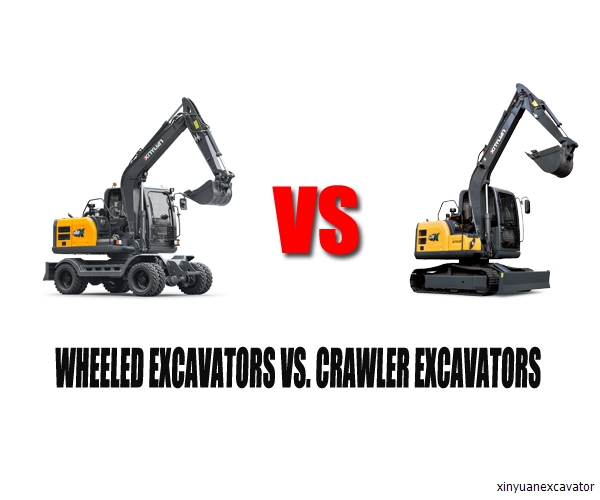Wheeled Excavators vs Crawler Excavators
2025-02-08
Wheeled excavators and crawler excavators each have their unique advantages and disadvantages.

Wheeled excavators and crawler excavators each have their unique advantages and disadvantages. They perform differently in various working environments and applications. Below is a comparison to help you better understand the differences.
1. Mobility and Flexibility
-
Wheeled Excavators:
-
Advantages: The biggest advantage of wheeled excavators is their high mobility. They are equipped with wheels, allowing them to travel quickly on hard roads like a car. They are suitable for long-distance movement, especially in urban construction, road projects, and large-scale work sites.
-
Disadvantages: Wheeled excavators are less effective in soft, slippery, or rugged terrain since the tires are not designed to handle these conditions as well.
-
Crawler Excavators:
-
Advantages: Crawler excavators provide better stability and traction, especially in soft soil, muddy, or sloped areas. They are suitable for working in rugged, muddy, or unstable surfaces, such as in mining, river dredging, and other challenging environments.
-
Disadvantages: Crawler excavators are slower in terms of mobility and require more time to move from one job site to another compared to wheeled excavators.
2. Work Efficiency and Performance
-
Wheeled Excavators:
-
Advantages: Wheeled excavators are ideal for tasks requiring frequent movement and high work efficiency, such as urban construction or infrastructure projects. Their high travel speed and flexibility make them well-suited for changing work locations quickly.
-
Disadvantages: They might lack the stability and power required for heavy-duty construction tasks, such as deep digging or material handling.
-
Crawler Excavators:
-
Advantages: Crawler excavators are more stable and powerful, making them suitable for heavy-duty construction tasks, such as deep excavation, mining, and other challenging applications. They offer better lifting capacity and operational stability, especially on uneven surfaces.
-
Disadvantages: Due to their slower speed and the need for more time to move between job sites, crawler excavators may have lower efficiency in projects requiring frequent relocations.
3. Fuel Consumption and Cost Efficiency
-
Wheeled Excavators:
-
Advantages: With their higher travel speed, wheeled excavators save a significant amount of time moving between work sites, which reduces overall project costs.
-
Disadvantages: Wheeled excavators typically have higher fuel consumption, especially during heavy-duty operations.
-
Crawler Excavators:
-
Advantages: Crawler excavators offer better fuel efficiency in heavy-duty tasks, as they are designed to handle heavy loads with stability.
-
Disadvantages: Crawler excavators are slower in movement, which can lead to longer travel times between work sites, indirectly increasing fuel consumption.
4. Durability and Maintenance
-
Wheeled Excavators:
-
Advantages: Wheeled excavators are easier to maintain as their tire replacement and upkeep are simpler than maintaining a crawler.
-
Disadvantages: In extreme conditions (such as mud or sand), the tires of wheeled excavators may wear down more quickly, leading to higher maintenance costs.
-
Crawler Excavators:
-
Advantages: Crawler excavators provide better stability, especially on challenging terrains, making them more durable in tough working conditions.
-
Disadvantages: Maintaining crawler tracks is more complex, especially after prolonged use. Tracks require regular inspections and replacements, which can increase maintenance costs.
5. Suitable Applications
-
Wheeled Excavators:
-
Applications: Suitable for urban construction, roadworks, factory construction, large warehouse projects, and environments where frequent relocations and high-efficiency work are necessary. They also perform well on hard-paved roads.
-
Crawler Excavators:
-
Applications: Ideal for rugged terrains, soft soil, hilly areas, mining, river dredging, and other heavy-duty tasks. They are particularly useful in environments that require high stability and heavy lifting capacity.
Summary
-
If your worksite requires fast movement, high efficiency, and is on urban or paved roads, a wheeled excavator would be a great choice.
-
If you need to work in challenging terrains, soft ground, or on slopes, and require more stability and power for heavy-duty tasks, a crawler excavator would be better suited to your needs.
Ultimately, the choice depends on your specific requirements, work environment, and budget. Which type of excavator do you lean toward?
